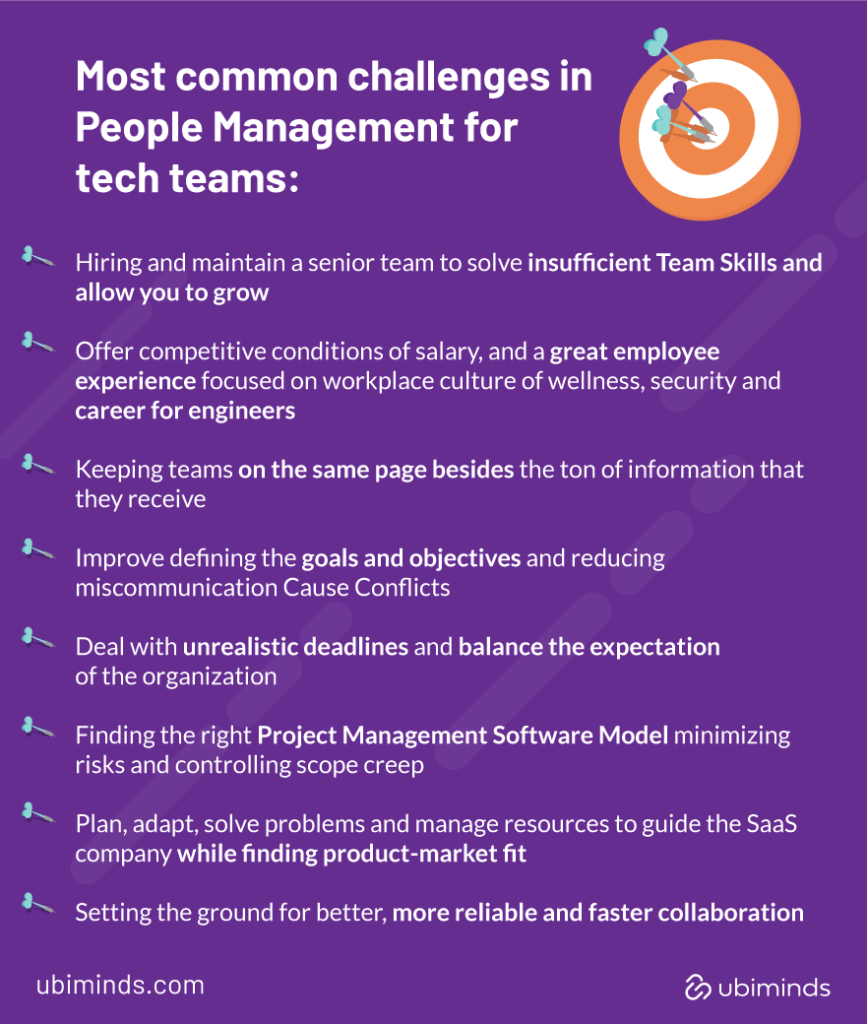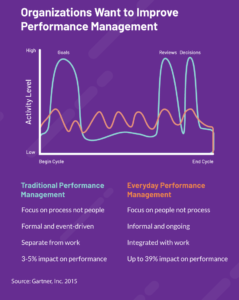People management is crucial to successful businesses and software. After all, achieving high performance in SaaS companies is a matter of recruiting and retaining a senior engineer team that works on computer or application programming fast enough for growth. From design and QA tests to Analysts, building a competitive software product demands gathering a team with multiple software skills and proficiency in different programming languages.
Software project management, on the other hand, has a broader scope than the software engineering process, as it involves communication, pre-and post-delivery support, etc. It’s a great career choice but one of the most challenging roles in IT since developers living in high-demand areas often receive many consultations per month from recruiters.
Some of the most common challenges in People Management for tech teams:

List of most common challenges in People Management for tech teams. Adapted from ProofHub’s blog.
- Hiring and maintaining a senior team to solve insufficient Team Skills and allow you to grow
- Offer competitive conditions of salary, and a great employee experience focused on the workplace culture of wellness, security and
career for engineers - Keeping teams on the same page beside the ton of information that they receive
- Improve defining the goals and objectives and reducing miscommunication Cause Conflicts
- Deal with unrealistic deadlines and balance the expectation of the organization
- Finding the right Project Management Software Model minimizing risks and controlling scope creep
- Plan, adapt, solve problems and manage resources to guide the SaaS company while finding product-market fit
- Setting the ground for better, more reliable, and faster collaboration
Considering the challenges of People Management, some requirements to become a great technology leader goes far beyond gathering technical skills, code knowledge, or certification.
As part of the technology leader job, we can mention: being an excellent communicator and listener to gain empathy and win the trust of all team members. Furthermore, s/he needs to establish a flexible management style that drives people to work free of excessive control and build management methods grounded in the principles of people, processes, technology, and leadership.
How do these 4 principles support SaaS companies to scale? Keep reading!
Why is high-performance engineering important for scaling a business?
Have you ever tried racing with a vintage car on a high-speed highway? However much you use all the resources of the vehicle and strive to go faster you will never go beyond 50 miles per hour.
This is the same situation as leading a team with reduced capacity or lacking specific technical skills. Without the adequate structure, it’s hard to support a high demand of work and maintain coding quality.
Could you invest in qualification and training? Yes, you could, but it takes time – the time that you could be growing and becoming more competitive in the market. And as you know: time is money, especially when we are talking about software development as a profitable product for SaaS companies.
So, basically, scaling your development team will depend on hiring and maintaining qualified engineers to build a proper architecture. That’s why Performance Engineering (PE) can be defined as an understanding of how all the parts in a system fit together and scale in performance from the beginning.
A short list of how a senior engineering team will help your company to save money:
- Senior engineers will identify product-market fit and product performance issues in the early stages saving time and resources
- Your company gain more flexibility and time to optimize software performance and improve processes to scale your Software Development Method
- You finally will be able to automate many development processes that don’t make sense to be done manually anymore
- The quality of the product will help your company to acquire customers more consistently
- More efficiency means less maintenance or eliminates the need for any additional technology investments to solve problems
- Seniors engineers create software more sustainable and long-term products increasing the return on investments (ROI)
It’s not just writing bug-free code and it’s much more than just ensuring software functionality. Building user-friendly and scalable interfaces it’s a matter of hard and soft skills that senior engineers can deliver faster and more efficiently than others.
How to keep software engineers at their prime: people management tips on hiring, performance management, WIIP, coaching/mentoring, and leadership
To keep software engineers at their prime you’ll need to pay attention in your Software Development Lifecycle from the beginning to the end:
#1 Hiring: get specialists support to plan and attract senior engineers
After discovering which roles are missing and block your business to grow, you’ll need to build an effective hiring strategy based on creating the perfect team composition.
- Get a specialist in tech recruitment to support you to Develop Recruiting Strategies, Identify Recruiting Sources and Networks and improve the interview process
- Use the IT Staff Augmentation and nearshore strategy for hiring and scaling your Software Development Team to cover skill gaps after evaluating the existing staff and identifying a lack of experience to fill.
- Doesn’t just sit there, but go hunt for your new Software Engineers, wherever they are
- Asses proficiency, skills requirements, as well as the product roadmap
- Analyze non-tech skills in addition to technical ones (communication, decision-making, attention to detail, presentation, and negotiation skills, etc).
- Set up a strategy to identify behavioral, social, and collaboration traits
- Take time enough to final approvals
- Organize and execute the offer/hire documentation: mainly the Statement of Work (SOW) and Master Services Agreement (MSA)
Check a list of advice from recruiters and candidates
#2 Performance Management

The differences between traditional performance management and everyday performance management. From: Valamis
Establish Performance Management Indicators that provide you with a quantifiable measure of performance for administration, compensation, and even development purposes. In fact, properly done performance appraisals are not only meant to benefit the employee but their supervisors, as well as the organization as a whole.
Some of these good practices to put on your list:
Develop clear role definitions, expectations, and goals: having well-defined roles and performance standards to make the hiring process easier, as trainers know exactly which areas need to be covered, and which information is nonessential. KPIs: Average of Time Spent on New Hiring Process by the recruiter, cost of hiring, etc.
Increase employee engagement: a shift in feedback frequency, with better conversations, a top-down approach, and focus on Culture is a perfect combination to keep the team engaged. KPIs: Turnover rates, absenteeism, Reviews participation rate, eNPS score, for example.
Develop managerial leadership and coaching skills: coaching is really useful to identify and solve problems before they get too big. If it’s not frequent, it’s not going to help at all. Monthly or quarterly meetings should be held to help keep employees on the right track. Another thing is: a senior engineer takes pride in educating, mentoring, and coaching but is also willing to learn from all of his peers. KPIs: Quantity of feedback exchanges and feedback quality (rating scale of 1-5, for example)
Boost productivity through improved performance: A study by Western Michigan University found that great feedback can increase performance by 5%-20%. Find the average revenue per team and subtract this by the average amount it takes to employ each team (average salary plus overhead). This amount is the dollar amount your company receives through the productivity of employees. KPIs: Total increase in net contribution, Profit, Customer Lifetime Value (CLV), Customer Satisfaction & Retention, Customer Support Tickets and so on.
Finding the right people: who to hire, when and why
Ok, you know that hiring seniors is the best to scale quality and results faster in your engineering team.
But how to find these people? When is time to go deep in scaling the top ones? Why do this if it’s more comfortable to keep the team small?
Who to hire: depends. Although you have professionals today who do everything like the full-stack developers, it’s really important to know your company needs and understand skills gaps in your team, for example: if you need to ensure 24×7 support and coverage you’ll need 3-4 DevOps/TechOps or if you count DBAs in here, increase the number to 6-7 people. Know more about software engineers roles in this article.
When to hire: If you have a product already validated in your market, built the minimum viable product (MVP), and acquired some customers, good news: you’re already eligible to scale. Other signals that its time is If you’re turning away clients or customers due to a lack of inventory, lack of employees, or simply not enough time in the day, then these are good signs it’s time to scale up.
Know more about how to do this.
Why hire: besides saving time and money, scale your software engineer team means your company it’s ready to become more competitive. Hiring seniors guarantee continuous innovation to create creative solutions to problems with less failing and more ROI. Understand how it can work for you.
Curious about how you can improve people management in your engineering team? Talk to Ubiminds
Ubiminds combines the best of each world when it comes to growing your software business. Ubiminds also supports People Management in the software engineer team acting as a boutique agency for filling Principal and Lead positions (as well as other leadership roles) but has a facilitated engagement model so you can upscale and downscale teams quickly. There are no fines for terminating SOWs, for example.

International Marketing Leader, specialized in tech. Proud to have built marketing and business generation structures for some of the fastest-growing SaaS companies on both sides of the Atlantic (UK, DACH, Iberia, LatAm, and NorthAm). Big fan of motherhood, world music, marketing, and backpacking. A little bit nerdy too!



